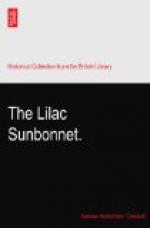“Now I will go to sleep,” said Winsome, resolutely shutting her eyes. “I will not think about him any more.” Which was assuredly a noble and fitting resolve. But Winsome had yet to discover in restless nights and troubled morrows that sleep and thought are two gifts of God which do not come or go at man’s bidding. In her silent chamber there seemed to be a kind of hushed yet palpable life. It seemed to Winsome as if there were about her a thousand little whispering voices. Unseen presences flitted everywhere. She could hear them laughing such wicked, mocking laughs. They were clustering round the crumpled piece of paper in the corner. Well, it might lie there forever for her.
“I would not read it even if it were light. I shall send it back to him to-morrow without reading it. Very likely it is a Greek exercise, at any rate.”
Yet, for all these brave sayings, neither sleep nor dawn had come, when, clad in shadowy white and the more manifest golden glimmer of her hair, she glided to the windowseat, and drawing a great knitted shawl about her, she sat, a slender figure enveloped from head to foot in sheeny white. The shawl imprisoned the pillow tossed masses of her rippling hair, throwing them forward about her face, which, in the half light, seemed to be encircled with an aureole of pale Florentine gold.
In her hand Winsome held Ralph Peden’s poem, and in spite of her determination not to read it, she sat waiting till the dawn should come. It might be something of great importance. It might only be a Greek exercise. It was, at all events, necessary to find out, in order that she might send it back.
It was a marvellous dawning, this one that Winsome waited for. Dawn is the secret of the universe. It thrills us somehow with a far-off prophecy of that eternal dawning when the God That Is shall reveal himself—the dawning which shall brighten into the more perfect day.
It was just the slack water—the water-shed of the night. So clear it was this June night that the lingering gold behind the western ridge of the Orchar Hill, where the sun went down, was neither brighter nor yet darker than the faint tinge of lucent green, like the colour of the inner curve of the sea-wave just as it bends to break, which had begun to glow behind the fir woods to the east.
The birds were waking sleepily. Chaffinches began their clear, short, natural bursts of song. “Churr!” said the last barn owl as he betook himself to bed. The first rook sailed slowly overhead from Hensol wood. He was seeking the early worm. The green lake in the east was spreading and taking a roseate tinge just where it touched the pines on the rugged hillside.
Beneath Winsome’s window a blackbird hopped down upon the grass and took a tentative dab or two at the first slug he came across; but it was really too early for breakfast for a good hour yet, so he flew up again into a bush and preened his feathers, which had been discomposed by the limited accommodation of the night. Now he was on the topmost twig, and Winsome saw him against the crimson pool which was fast deepening in the east.




